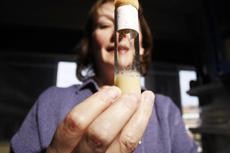Linda Restifo of the Arizona Research Laboratory and her team of researchers are studying fruit fly brain development to find treatments to combat behavioral and cognitive symptoms that affect children with mental retardation or autism.
Restifo and her team recently received a grant from the Autism Speaks Foundation. With this funding, Restifo and the Laboratory Division of Neurobiology are testing drugs to determine whether or not they can change the size and shape of genetically abnormal brain neurons.
“”There has to be a better way to treat these disorders,”” said Restifo, a UA professor of neurobiology, neurology, cell biology and anatomy. “”There should be a drug that would be safe for kids to take and would promote better brain development. It certainly could not undo abnormalities, it cannot reverse time, but it would enhance function.””
Restifo and her team of researchers are working with mutations in fruit flies that are the counterparts to mutations in humans that cause mental retardation or autism, to try and figure out what is wrong with the brain neurons.
“”It’s really a very simple idea: Look for the abnormalities that are pretty dramatic, and then look for drugs that reverse them. Then the idea would be to move to an animal model. We aren’t trying to invent new drugs – we are looking on the medicine shelf for drugs that are already there, that can potentially be valuable.””
With the research funds they received, researchers were able to screen a library of 1,040 known drugs. They found several dozen drugs that straighten out curly brain neurons. According to Restifo, the curliness shows a lack of protein that is thought to be important in brain development.
“”These are pivotal experiments, testing to see size and shape changes of individual brain neurons when you culture them in the lab,”” she said. “”These are brain cells from the brains of developing fruit flies. Fruit flies are very valuable and are just … starting to be used for drug discovery; this is a very exciting avenue.””
This research is essential because although it may not cure autism, it has the power to increase an individual’s functionality.
“”When you think about brain development disorders and if you really think about functionality – can a person live on their own? Can they have a job? Can they have a social network? Can they have meaningful social interactions with people? That is really what you want,”” Restifo said. “”Anything that you can do to shift people to the higher end of that spectrum is usually beneficial. What’s really important is, what is the quality of their life like?””
According to Restifo, the other side of their research project was actually unanticipated.
“”It turns out the mutation that makes these neurons curly, has messed up a gene that encodes a protein called fascin. We are not sure what exactly fascin does during brain development, but we know a lot about its role in cancer,”” she said.
Restifo said many cancer labs all over the world have determined that if certain types of cancer have high amounts of fascin, the patient is not going to have a good prognosis.
“”We are really excited about the possibility that these drugs are going to be useful as blockers of tumor invasion. Given the options for brain tumors are not that good right now, drugs that block fascin could be really helpful for treating tumor patients,”” she said.
According to Restifo, now is the perfect time for this research; there is an enormous need from kids who deserve to have a higher level of functioning.
“”Science is ready for this, all the pieces are in place,”” said Restifo. “”We have a better and better understanding of how the brain develops; this is like the final frontier: how do we make it better?””









